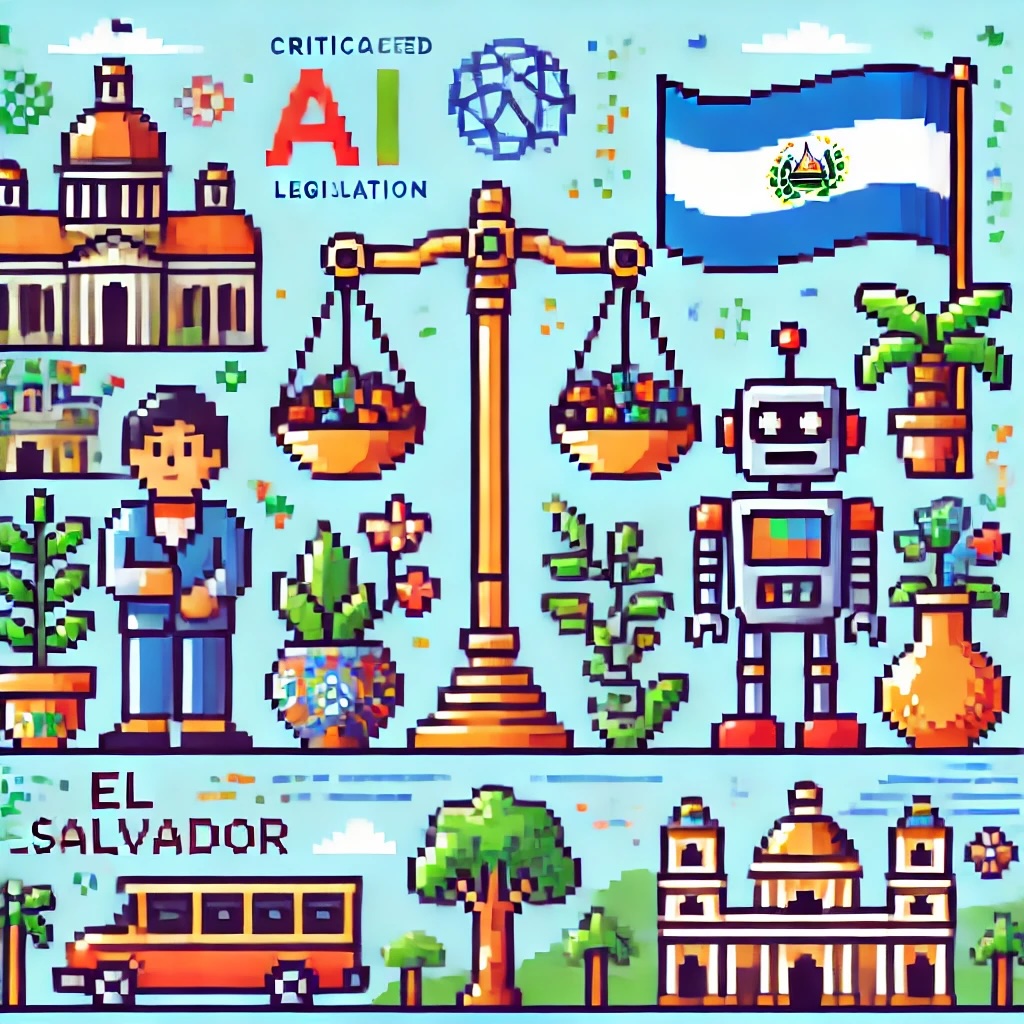
by Joche Ojeda | Jul 6, 2024 | Uncategorized
AI Integration and Future Plans
El Salvador has embarked on a remarkable journey of technological transformation under the leadership of President Nayib Bukele. Building on the momentum from its pioneering adoption of Bitcoin as legal tender, the nation is now setting its sights on integrating Artificial Intelligence (AI) into various sectors to foster innovation and growth. This article explores President Bukele’s vision for AI, the potential benefits and challenges, and the critical need for establishing robust AI legislation.
Government Vision for AI
President Bukele envisions a future where AI plays a central role in El Salvador’s development. In recent developments, he appointed Brian Roemmele, a renowned expert in voice technology and AI, as an AI advisor. Roemmele’s appointment highlights the government’s commitment to integrating AI to drive economic growth and educational opportunities, positioning El Salvador as a leader in the digital age[7][8][9].
Economic Growth: By fostering an environment conducive to AI innovation, El Salvador aims to attract tech companies and startups, thereby boosting economic growth and creating high-tech job opportunities.
Smart Governance: The integration of AI in government operations promises to enhance efficiency, transparency, and responsiveness, making public administration more effective and citizen-centric[28][30].
Global Competitiveness: Bukele’s vision includes positioning El Salvador as a leader in AI within Latin America, much like its pioneering role with Bitcoin. This involves not only adopting AI technologies but also setting standards that other countries can follow.
Potential Benefits and Challenges
The potential benefits of AI integration are immense:
Economic Benefits: AI can drive significant economic growth by improving productivity, fostering innovation, and creating new job sectors[28][30].
Social Benefits: AI can enhance the quality of life by improving healthcare, education, and public services, leading to a more inclusive and equitable society[27][29].
However, the challenges cannot be overlooked:
Ethical Concerns: Ensuring that AI systems are fair, transparent, and free from bias is crucial to prevent societal harm.
Data Privacy: Protecting the personal data of citizens is essential to maintain trust and prevent misuse.
Workforce Displacement: The transition to an AI-driven economy must be managed carefully to support workers displaced by automation through reskilling and education initiatives.
The Need for AI Legislation
To harness the full potential of AI while addressing its challenges, it is imperative to establish a comprehensive AI legal framework. This framework should cover several key areas:
1. Ethical Standards
- Transparency: AI developers must disclose methodologies and data sources to ensure clarity and trust.
- Accountability: Clear accountability mechanisms for AI decisions, especially in critical sectors like healthcare and finance.
- Fairness: Measures to prevent bias and ensure equitable treatment for all users of AI systems.
2. Data Protection
- Privacy Laws: Strengthened data privacy laws to safeguard citizens’ information.
- Consent: Ensuring individuals have control over their data, including the ability to opt-out of AI data processing.
3. Innovation Incentives
- Research Grants: Funding for AI research and development projects.
- Tax Breaks: Tax incentives for companies investing in AI technologies and infrastructure.
4. Workforce Transition
- Reskilling Programs: Programs to help workers displaced by AI acquire new skills and transition to new job opportunities in the AI sector.
- Education Initiatives: Integrating AI and digital literacy into the national education curriculum.
5. International Cooperation
- Standards Collaboration: Working with international bodies to adopt global AI standards and best practices.
- Regional Partnerships: Fostering regional cooperation in AI research and development.
Conclusion
El Salvador’s journey towards technological transformation continues with the integration of AI. By setting the rules for AI through robust legislation, El Salvador can ensure that it remains at the forefront of innovation in Latin America. The proposed AI legal framework not only addresses the ethical and practical challenges of AI but also positions the country as a leader in the digital future. As El Salvador charts this new course, the commitment to innovation and responsible governance will be key to its success.
This article outlines the government’s vision for AI in El Salvador, the potential benefits and challenges, and the critical need for AI legislation. It aims to inform and engage readers, encouraging them to support and contribute to the country’s digital future.
Related Articles
El Salvador: Digital Transformation Initiatives
El Salvador: The Implementation of Bitcoin as Legal Tender
El Salvador’s Technological Revolution

by Joche Ojeda | Jul 3, 2024 | A.I, Blockchain, El Salvador
El Salvador, my birthplace, has recently emerged as a focal point for technological innovation under the leadership of President Nayib Bukele. Born in Suchitoto during the civil war and now living as a digital nomad in Saint Petersburg, Russia, I have witnessed El Salvador’s transformation from a distance and feel compelled to share its story. This article is the first in a series exploring how blockchain technology, financial services, and artificial intelligence (AI) can help a small country like El Salvador grow.
Historical Context and Economic Challenges
El Salvador has faced significant economic challenges over the past few decades, including poverty, gang violence, and a heavy reliance on remittances from abroad. The economy has traditionally been rooted in agriculture, with coffee and sugar being key exports. However, President Bukele, who took office on June 1, 2019, has sought to address these challenges by diversifying the economy and embracing technology as a key driver of growth.
Bukele’s Vision for Economic Transformation
President Bukele’s administration has prioritized technological innovation as a catalyst for economic transformation. His vision is to modernize the country’s infrastructure and position El Salvador as a hub for technological innovation in Latin America. This vision includes the strategic shift from an agriculture-based economy to one focused on technology, financial services, and tourism. The goal is to create a more resilient and diverse economic base that can sustain long-term growth and development.
The Adoption of Bitcoin as Legal Tender
One of the most groundbreaking moves by Bukele’s administration was the introduction of the Bitcoin Law, passed by the Legislative Assembly on June 9, 2021. This law made Bitcoin legal tender alongside the US dollar, which had been the country’s official currency since 2001. The rationale behind this decision was multifaceted:
- Financial Inclusion: With a significant portion of the population lacking access to traditional banking services, Bitcoin offers an alternative means of financial inclusion.
- Reduction in Remittance Costs: Remittances make up a substantial part of El Salvador’s economy. Bitcoin’s adoption aims to reduce the high transaction fees associated with remittance services.
- Economic Innovation: By adopting Bitcoin, El Salvador aims to attract foreign investment and position itself as a leader in cryptocurrency and blockchain technology.
The implementation of Bitcoin involved launching the Chivo Wallet, a state-sponsored digital wallet designed to facilitate Bitcoin transactions. The government also incentivized adoption by offering $30 worth of Bitcoin to citizens who registered for the wallet.
Initial Reactions and Impact
The reaction to the Bitcoin Law was mixed. While some praised the move as innovative and forward-thinking, others raised concerns about the volatility of Bitcoin and its potential impact on the economy. Despite these concerns, the Bukele administration has remained committed to its Bitcoin strategy, continuing to invest in Bitcoin and integrate it into the national economy.
Digital Transformation Initiatives
I
n addition to Bitcoin adoption, El Salvador has partnered with global tech giants like Google to enhance its digital infrastructure. These partnerships aim to modernize government services, improve healthcare through telemedicine platforms, and revolutionize education by integrating AI-driven tools. For instance, Google’s collaboration with the Salvadoran government includes training government agencies on cloud technologies and developing platforms that allow interoperability between institutions.
Strategic Shift to Technology, Financial Services, and Tourism
President Bukele’s broader economic strategy involves shifting El Salvador’s economic focus from traditional agriculture to more dynamic and sustainable sectors like technology, financial services, and tourism. This shift aims to create high-value jobs, attract foreign investment, and build a more diversified economy.
- Technology: By investing in digital infrastructure and fostering a favorable environment for tech startups, El Salvador aims to become a regional tech hub.
- Financial Services: The adoption of Bitcoin and other fintech innovations is intended to transform the financial landscape, making it more inclusive and efficient.
- Tourism: Enhancing the country’s tourism sector, with initiatives to promote its natural beauty and cultural heritage, is another key pillar of Bukele’s economic strategy.
Conclusion and Future Prospects
El Salvador’s journey towards becoming a technological leader in Latin America is a testament to the transformative power of visionary leadership and innovative policies. Under President Bukele, the country has taken bold steps to embrace technology, from adopting Bitcoin to integrating AI into public services. This series of articles will delve deeper into these initiatives, exploring their impact, challenges, and the future prospects for El Salvador in the global technological landscape.
By understanding El Salvador’s technological revolution, we can gain insights into the potential for other nations to leverage technology for economic and social development. The next article in this series will focus on the detailed implementation of Bitcoin as legal tender, examining the steps taken by the Bukele administration and the outcomes observed so far.
This introductory article sets the stage for a comprehensive exploration of El Salvador’s technological transformation under President Bukele. The subsequent articles will provide in-depth analyses and propose potential AI legislation to ensure the country’s continued leadership in technology within Latin America.

